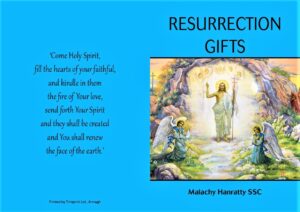The object of Vatican II was to rejuvenate the pilgrim church on its journeying through the modern world. It re-emphasised the fundamental truths that ‘God loves us first’, that each one is called into a deepening, conscious relationship with Jesus Christ and into responding to the guidance of God’s Spirit, leading us all into unity.
Emphasising that what we see God doing in Scripture tells us what He is doing, here and now, among us. So the Council encouraged that the practice of prayerful ‘listening’ to the Spirit in the Scriptures (Lectio Divina) flow out from mostly only Religious Communities to all convinced Christians. A great teacher in Spirituality helped us missionaries develop it further.
In developing and sharing with groups of mostly new Christians in our Missionary work in Japan I found it very fruitful. It is also becoming quite fruitful here in Ireland.
I had spent much time talking to God. But this ‘pondering the Word of God’ changed my prayer towards more of an ‘interaction’; it provided space, patience and openness to ‘listen’, to hear and be moved inwardly. So ‘Praying Scripture’ means the help that a text of Scripture gives towards this personal conversation with God. Remember, that what we see God doing in the Scriptures in the past, is telling us what He is doing, here and now, among us!
So beyond our talking to God this helps us to ‘listen’. We ‘listen’ by noticing movements in the heart and mind. Examples; A word in the text may hold my attention and as I dwell on it I notice things in a new way or, pulled by imagination deeper into the scene, I may taste feelings of those in it. It can cause memories of experiences to arise. Gradually I will find myself talking to the God I met in my experience.
So, noticing movements in my heart and mind become my listening. Later I reflect further on them. Yes, the Holy Spirit is at work. And this builds up a personal relationship. Remember in this process, waiting – with openness – is an important pose. Scripture study can add to the pondering, but basically the text alone is all that is needed for ‘Praying Scripture.’
Here are a series of ‘Guided Meditations’ that I used with groups. They are examples of what can happen in a ‘praying Scripture’ period. But remember much is based on my experience. So please be careful to understand that these are only examples of what one might meet. They give reassurance that, if you find them coming into your pondering, you are not being distracted by memories or imaginations about the event but being led on to recognise God acting in your own life.
You take out of your ponderings what vibes with your experience and build on that. Think of this input as ‘hints’, ‘a demonstration’, a ‘springboard.’ Gradually you will find different and deeper insights from yourself or from others but hopefully these examples of mine help you to begin a fruitful ‘praying Scripture’.
I recommend first reading the whole planned text. Then gazing attentively at it, allow the Spirit to lead you here and there! In your planned length of pondering time you may be held on a certain word or part of the text. Stay here as long as held. Then, when you feel drawn, continue the text till stopped again. Even after times of having used the whole text one can feel drawn back to it again and again – each time it can provide further noticing. These ‘Guided Meditations’ are examples of my pondering. Find what moves you.
After your ‘Silent praying period’ a short reflection or thinking time might help you clarify what you experienced in the silent time. Asking yourself a question such as, ‘Did I see anything in a new way?’ or ‘Was my heart moved in a new way?’ might help. This can help your noticing when repeating pondering a text. Sharing experiences with another also helps. Repeating pondering the same text gives added fruit – or going back to one before. But you will learn more by doing. Just ‘try and see’ – with a certain perseverance!
Download Resurrection Gifts here: Resurrection Gifts

